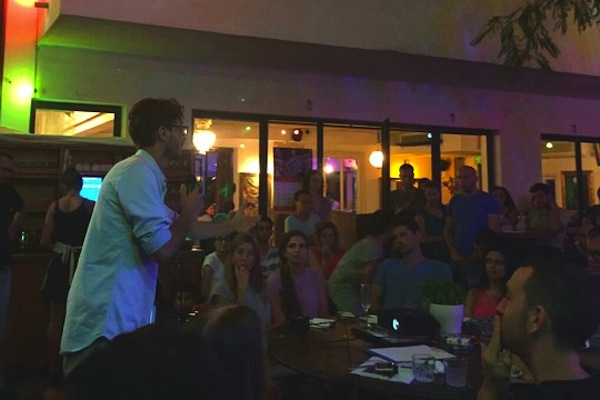They said the two-state solution is no longer relevant, that we cannot evacuate settlements, that there is ‘no partner for peace.’ Then I heard Iyad speak to a group of Israelis in a Tel Aviv bar.
By Yael Burstein

Neither of us could hide our excitement as he stood up to speak before a crowd of over 120 young Israelis in a Tel Aviv bar. While in his childhood Iyad Othmani was forced to wait for hours at checkpoints, while soldiers made sure over and over again that he could cross to go to school, on this night — he was the keynote speaker.
We worked for months to ensure that Iyad could come speak before Israelis — what we believed would help break a few bricks in the wall, and look past this Green Line that everyone is always talking about, yet do not know where it is located, what it symbolizes, and why the hell it’s green in the first place.
I met Iyad for the first time at a meeting organized by Geneva Initiative activists in Jerusalem. I understood that we know so little about what is happening on the other side of the Green Line, and that if only we could understand the real difficulties plaguing the other side on a daily basis, perhaps we would be able to cause things to turn out differently, to cause people to think differently.
Things we do not know
They say that millennials are focused solely on themselves, that we are always looking at the screen, that we no longer believe in that concept that the “adults” have been talking about for years — we long for it, yet we do nothing to advance it. But the participants who came to hear Iyad talk about his life in Ramallah as a young Palestinian proved otherwise. With patience and hardly any interruptions from the audience, with smart questions and a real desire to learn and know, we laid the cornerstone of a bridge that will be built over the gap of narratives.
While 70 percent of young Palestinians claim no political affiliation, Iyad heads three different projects with the goal of sounding more and more Palestinian voices calling for the end of the conflict and separating into two states, based on the Geneva Initiative. When over 20 percent of the 2.9 million Palestinians are unemployed and 14 percent live below the poverty line [Hebrew] — doing so is no small feat.

Most Israelis, says Iyad, think that the Palestinian Authority exists independently and that the checkpoints exist only in the area between the PA and Israel; they do not understand the difference between passing between Israel and PA-controlled areas and crossing any other border. But this is not the situation. The checkpoints are spread out across the West Bank, separating between cities, villages, families. They make people’s lives miserable and hopeless. Want to know why Palestinians don’t want to speak with Israelis? Precisely because of this. A home that is destroyed, tear gas that breaks up a gathering at a local community center because someone threw a stone, administrative detention — all of them bring us further away from dialogue and strengthen extremism.
For you, Iyad adds, this is just another item in the newspaper. For us it’s a way of life.
He turns to the crowd and asks: “Did you know that we are allotted only 14 percent of the water in the West Bank — even less than the little that was promised by the Oslo Accords? According to international law the water belongs to the Palestinians, and yet the PA is forced to buy its water from Israel’s national water company. The rest goes to Israel.”
This is just a small example of a problem that will be solved when a Palestinian state is established, he says. “Give us the opportunity to worry about our water sources, to have our own Internet providers just like you do (Israel limits 3G services in Palestinian areas of the West Bank, despite an agreement signed last November between Israel and the PA that was supposed remove these limits). Allow a Palestinian policeman to stop me and check my ID, not one of your soldiers. I am even willing to wade through the bureaucracy — but in my state, where I am an equal citizens. Just like you.
Before my Zionism turns into cynicism
Iyad finished his talk and I was left along with my thoughts. They say the two-state solution is no longer relevant, that the present reality simply won’t allow for it to happen, that we cannot — once again — remove people from their homes in the settlements, that there is “no partner.” Meanwhile, however, we continue to struggle for creating our own boundaries, since we understand that without them, things can only get worse.
I understood that we need a new definition that will allow us to know where we belong, to connect us to a community, will give us some kind of attachment that goes beyond land. In the name of Judaism or Zionism we continue to look for anything that will help us define ourselves, meanwhile we have prevented the Palestinians from doing that very thing for nearly 50 years.
How did we forget, along the way, to allow them to take responsibility for their lives, to build a generation of leaders who will promote dialogue rather than extremism, who will see the person standing before them, and not only the one who mans the checkpoint?
Just a moment before I let my Zionism turn into cynicism, that summer night in the middle of July allowed me to imagine something different — to look reality straight in the eye without blinking or becoming confused, and to dare and say the word “peace” once again.
Yael Burstein is an organizational consultant based in Ramat Gan. This article was first published in Hebrew on Local Call. Read it here.

